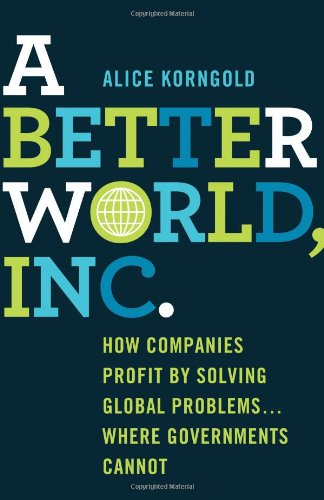It was and Tuesday, October 22, 2013 when I wrote So where to Next for Corporate Governance? The article drew plenty of attention and the tweet found its way all over the Twitter-sphere.
And yet, there were no responses to the question: “So where to Next for Corporate Governance?”
What I was hoping for was to elicit something insightful, something that described the macro-strategic importance of corporate governance and social responsibility, particularly from the professionals who drive strategic initiatives in these disciplines. Influencers in the Boardroom, Board advisors, women in marketing, Corporate Secretaries and General Counsels. Where were they and why didn’t they leap at the bait. Well, let me explain what happened next—just as the day I wrote So where to Next for Corporate

Alice Korngold
Governance—it was a pretty normal day until my Twitter DM inbox came alive with: “Charlie, would you be interested in reviewing my book, A Better World, Inc.” I had been planning to head over to Amazon to order myself a copy, and here was the author, the eminent Alice Korngold, offering me an opportunity to review her latest book.
Just a few days later, the brown cardboard-wrapped parcel arrived, direct from the publishers. I couldn’t wait to read it, but I had to. The year-end and Annual Report demanded my full attention. Luckily, Alice’s writing style is so accessible and friendly, she speaks straight and from the heart. Clearly her thoughts are based on two decades of phenomenal, incomparable experience. She’s seen it all, from a corporate perspective, of that I am certain. Each of her ideas is referenced and meticulously indexed. It’s like a thesis, only this one makes sense: what we do, individually, and as corporations, has lasting and profound consequences. What those consequences are is our own choice, both severally and as groups. In the case of corporations, those “groups” are Boards of Directors, who are ‘jointly and severally responsible’ for the actions of the corporation.
They (the stewards entrusted with the corporation’s resources) are responsible to the shareholders for their actions, particularly for the creation of ‘profit’, but they are also responsible towards the far-wider group of stakeholders for the maintenance and creation of ‘value’. My question is, to whom are they actually accountable? I would say: they (the corporations and their Boards and their shareholders) are accountable to you and to me. After all, this is our planet, our world… They are operating in our living environment, and in our lives.
One of Alice’s questions is: What constitutes ‘value’ as opposed to sheer ‘profit’ in terms of globally impactful corporations?.
The answer is one that most of us who are parents or have any interest in ‘humanity’ would say is: “sustainability”. Without being ‘sustainable businesses’, corporations or companies have no legitimate business. Yes, I know, it’s a tough one… Of course there are opportunities to make big bucks, quick ‘n dirty; they are everywhere… but what is the long-term impact on the environment and on humanity of profiteering, and what lasting ‘value’ is left in their wake?
Alice draws on Theodore Roosevelt’s Seventh Annual Message to Congress in which he said (I have expanded the quote here):
“The conservation of our natural resources and their proper use constitute the fundamental problem which underlies almost every other problem of our National life. We must maintain for our civilization the adequate material basis without which that civilization can not exist. We must show foresight, we must look ahead. As a nation we not only enjoy a wonderful measure of present prosperity but if this prosperity is used aright it is an earnest of future success such as no other nation will have.
The reward of foresight for this Nation is great and easily foretold. But there must be the look ahead, there must be a realization of the fact that to waste, to destroy, our natural resources, to skin and exhaust the land instead of using it so as to increase its usefulness, will result in undermining in the days of our children the very prosperity which we ought by right to hand down to them amplified and developed.
For the last few years, through several agencies, the Government has been endeavoring to get our people to look ahead and to substitute a planned and orderly development of our resources in place of a haphazard striving for immediate profit.”
Alarmingly, it is now a full 107 years since Roosevelt’s Annual Message to Congress on December 3, 1907!
Alice argues that “Only global corporations have the resources, global reach, and self-interest to build a better world.” What Alice teaches us throughout this fabulously penned exposé is that ‘value’ isn’t valuable unless it is shared. Value cannot be defined simply by the flow of cash towards directors and shareholders, it is created through the actions of the company, through the products, through the logistics and supply chains, and through the interface with our precious, small world. Now, most of us can say these words and probably get away with it over a dinner table, where nobody is likely to challenge us, at least not in earnest. But try writing it down and publishing it is a real test of the author’s belief; one which Alice passes in meticulously documented detail, with flying colours. These are ‘colours’ are gleaned from 20 years at the ‘coal-face’ of corporate Boards, and Alice’s concerns about the imperative of climate change are well founded. It’s clear that there is a natural groundswell against sheer ‘profiteering’ to support her thesis (see this article on “Inclusive capitalism: searching for a purpose beyond profit” for example).
The flip-side of this coin is that the same groundswell is beginning to support, even demand, responsible business, sometimes through direct ‘Shareholder Activism’. Corporations that are engaged with stakeholders as well as with shareholders, balancing their stewardship and fiduciary duties with social responsibility—are beginning to gain reputational advantage in the market. The question is: how is it possible to achieve this balance? Alice puts it that way is through ‘Board governance’. The adoption of fully integrated business models, strategies that take into account the full range of consequences and, by implication, the power of the corporation to do good for everyone, good for the planet, lasting good, good—not simply the superficial good derived from making profit.
By using ‘ Integrated Reporting’ (<IR>) as a tool to encourage integrated thinking about value, Board’s of Directors can hold themselves to account for the wider environmental impact of their corporations. A new view on ‘value’ is urgently required and the chapter on “Successful Companies Ensure Effective Board Governance, Engage Stakeholders and collaborate with NGOs and Each Other” is a textbook guide to how Boards of Directors can govern their organisations with this as the strategic driver.
I thoroughly enjoyed this book. Alice’s contribution is an easy and accessible read, despite the weighty nature of the subject. Alice’s conclusions very effectively drive home the point that it is time for Boards of Directors, governance advisors, and everyone with any influence to focus on long term value, and to champion sustainability throughout every business strategy. The book also very neatly answers the question of ‘so where to next for Corporate Governance?’: It is time for Boards to govern for global benefit, not for local, short-term profit. The time for frivolous cash profiteering is over. We could dive into the subject of Executive Pay and Say on Pay right here, but we’ll keep that one in reserve for another occasion.
Thank you, Alice, for this wonderful work, and thank you for your delightful generosity in sending me ‘A Better World, Inc.’ for review. Your kindness walks the talk of ‘A Better World, Inc.’.
I hope I have done it some justice here and I am going to lobby for it to become compulsory reading for students of corporate governance at the ICSA and of directorship at the IoD.
A Better World, Inc. is available in hardback and Kindle from Amazon:


